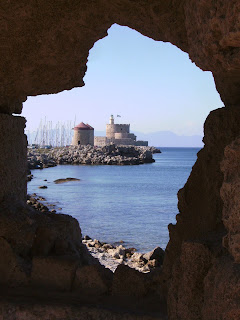 A place of permanent residence for many expats, Rhodes has all the things a tourist typically wants: beaches, nightlife, culture, and scenery. Its UNESCO Heritage Old Town with its ancient labyrinthine streets with romantic Knight driven houses is worth a visit in itself.
A place of permanent residence for many expats, Rhodes has all the things a tourist typically wants: beaches, nightlife, culture, and scenery. Its UNESCO Heritage Old Town with its ancient labyrinthine streets with romantic Knight driven houses is worth a visit in itself. Settled by Minoans and Mycenaeans, then the Dorians, its island location has allowed its allegiances to swap constantly: early on they were allied to Athens, then the Persians, then the Athenians again, joining the Delian League in 477. It was briefly allied with Sparta, then Athens again, then Persia again, actually joining them in a battle against Alexander the Great, until it appeared he would win, so returning to side with Athens again. Ptolemy sent his son Demetrius "the Besieger of Cities" to conquer Rhodes, and after repelling him, they built the Colossus of Rhodes (Helios Apollo), one of the Seven Wonders of the Ancient World. Rhodes then became a power unto itself and a force in the Aegean. It allied itself with Julius Caesar and eventually it became part of the Roman empire, beginning its decline.
Settled by Minoans and Mycenaeans, then the Dorians, its island location has allowed its allegiances to swap constantly: early on they were allied to Athens, then the Persians, then the Athenians again, joining the Delian League in 477. It was briefly allied with Sparta, then Athens again, then Persia again, actually joining them in a battle against Alexander the Great, until it appeared he would win, so returning to side with Athens again. Ptolemy sent his son Demetrius "the Besieger of Cities" to conquer Rhodes, and after repelling him, they built the Colossus of Rhodes (Helios Apollo), one of the Seven Wonders of the Ancient World. Rhodes then became a power unto itself and a force in the Aegean. It allied itself with Julius Caesar and eventually it became part of the Roman empire, beginning its decline.Part of Byzantium, it gained independence when Constantinople was seized by crusaders, and was controlled later by the Genoese. The Knights of St. John arrived in 1309 and ruled for 213 years until they were ousted by the Ottomans, who were in turn ousted by the Italians four centuries later. After 35 years of Italian occupation Rhodes became part of Greece along with the other Dodecanese islands in 1947.
Within the thick walls of the Old Town lie many marvels and delights: it is dominated by the Kollakio (the Knight's Quarter), the Hora (the Turkish Quarter) and the Jewish Quarter. Accessible via 9 gates (pyles) and two rampart-portals, it is a mixture of all its many heritages: Byzantie, Turkish, Latin, and other Greek styles. Don't miss Avenue of the Knights, divided into their seven tongues (England, France, Germany, Italy, Aragon, Auvergne, and Provence), each responsible for a part of the ramparts. There is also the remains of a temple to Aphrodite. Hora has its share of Ottoman mosques as well as an 18th century Muslim library while the Jewish Quarter has a synagogue dating back to 1577. Watch out for the tourists... there are lots of them, but they can't spoil such a magnificent place!
Source: Lonely Planet Greece 8th Edition























No comments:
Post a Comment